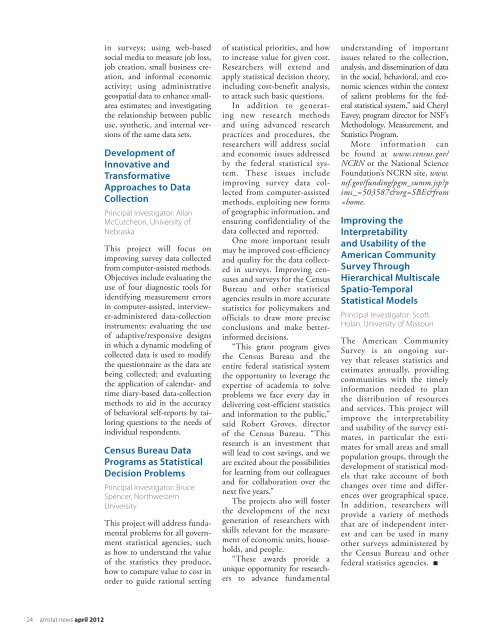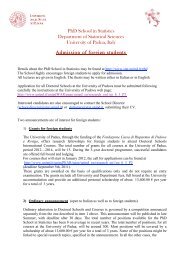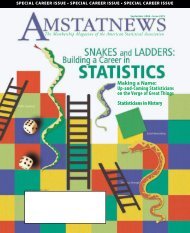Amstat News - American Statistical Association
Amstat News - American Statistical Association
Amstat News - American Statistical Association
Create successful ePaper yourself
Turn your PDF publications into a flip-book with our unique Google optimized e-Paper software.
24 amstat news april 2012<br />
in surveys; using web-based<br />
social media to measure job loss,<br />
job creation, small business creation,<br />
and informal economic<br />
activity; using administrative<br />
geospatial data to enhance smallarea<br />
estimates; and investigating<br />
the relationship between public<br />
use, synthetic, and internal versions<br />
of the same data sets.<br />
Development of<br />
Innovative and<br />
Transformative<br />
Approaches to Data<br />
Collection<br />
Principal Investigator: Allan<br />
McCutcheon, University of<br />
Nebraska<br />
This project will focus on<br />
improving survey data collected<br />
from computer-assisted methods.<br />
Objectives include evaluating the<br />
use of four diagnostic tools for<br />
identifying measurement errors<br />
in computer-assisted, interviewer-administered<br />
data-collection<br />
instruments; evaluating the use<br />
of adaptive/responsive designs<br />
in which a dynamic modeling of<br />
collected data is used to modify<br />
the questionnaire as the data are<br />
being collected; and evaluating<br />
the application of calendar- and<br />
time diary-based data-collection<br />
methods to aid in the accuracy<br />
of behavioral self-reports by tailoring<br />
questions to the needs of<br />
individual respondents.<br />
Census Bureau Data<br />
Programs as <strong>Statistical</strong><br />
Decision Problems<br />
Principal Investigator: Bruce<br />
Spencer, Northwestern<br />
University<br />
This project will address fundamental<br />
problems for all government<br />
statistical agencies, such<br />
as how to understand the value<br />
of the statistics they produce,<br />
how to compare value to cost in<br />
order to guide rational setting<br />
of statistical priorities, and how<br />
to increase value for given cost.<br />
Researchers will extend and<br />
apply statistical decision theory,<br />
including cost-benefit analysis,<br />
to attack such basic questions.<br />
In addition to generating<br />
new research methods<br />
and using advanced research<br />
practices and procedures, the<br />
researchers will address social<br />
and economic issues addressed<br />
by the federal statistical system.<br />
These issues include<br />
improving survey data collected<br />
from computer-assisted<br />
methods, exploiting new forms<br />
of geographic information, and<br />
ensuring confidentiality of the<br />
data collected and reported.<br />
One more important result<br />
may be improved cost-efficiency<br />
and quality for the data collected<br />
in surveys. Improving censuses<br />
and surveys for the Census<br />
Bureau and other statistical<br />
agencies results in more accurate<br />
statistics for policymakers and<br />
officials to draw more precise<br />
conclusions and make betterinformed<br />
decisions.<br />
“This grant program gives<br />
the Census Bureau and the<br />
entire federal statistical system<br />
the opportunity to leverage the<br />
expertise of academia to solve<br />
problems we face every day in<br />
delivering cost-efficient statistics<br />
and information to the public,”<br />
said Robert Groves, director<br />
of the Census Bureau. “This<br />
research is an investment that<br />
will lead to cost savings, and we<br />
are excited about the possibilities<br />
for learning from our colleagues<br />
and for collaboration over the<br />
next five years.”<br />
The projects also will foster<br />
the development of the next<br />
generation of researchers with<br />
skills relevant for the measurement<br />
of economic units, households,<br />
and people.<br />
“These awards provide a<br />
unique opportunity for researchers<br />
to advance fundamental<br />
understanding of important<br />
issues related to the collection,<br />
analysis, and dissemination of data<br />
in the social, behavioral, and economic<br />
sciences within the context<br />
of salient problems for the federal<br />
statistical system,” said Cheryl<br />
Eavey, program director for NSF’s<br />
Methodology, Measurement, and<br />
Statistics Program.<br />
More information can<br />
be found at www.census.gov/<br />
NCRN or the National Science<br />
Foundation’s NCRN site, www.<br />
nsf.gov/funding/pgm_summ.jsp?p<br />
ims_=503587&org=SBE&from<br />
=home.<br />
Improving the<br />
Interpretability<br />
and Usability of the<br />
<strong>American</strong> Community<br />
Survey Through<br />
Hierarchical Multiscale<br />
Spatio-Temporal<br />
<strong>Statistical</strong> Models<br />
Principal Investigator: Scott<br />
Holan, University of Missouri<br />
The <strong>American</strong> Community<br />
Survey is an ongoing survey<br />
that releases statistics and<br />
estimates annually, providing<br />
communities with the timely<br />
information needed to plan<br />
the distribution of resources<br />
and services. This project will<br />
improve the interpretability<br />
and usability of the survey estimates,<br />
in particular the estimates<br />
for small areas and small<br />
population groups, through the<br />
development of statistical models<br />
that take account of both<br />
changes over time and differences<br />
over geographical space.<br />
In addition, researchers will<br />
provide a variety of methods<br />
that are of independent interest<br />
and can be used in many<br />
other surveys administered by<br />
the Census Bureau and other<br />
federal statistics agencies. n




